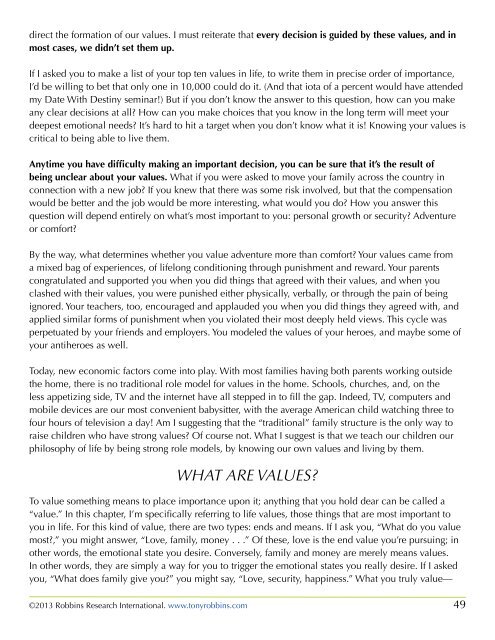Tony Robbins -Re-Awaken_the_Giant_Within
- No tags were found...
Create successful ePaper yourself
Turn your PDF publications into a flip-book with our unique Google optimized e-Paper software.
direct <strong>the</strong> formation of our values. I must reiterate that every decision is guided by <strong>the</strong>se values, and in<br />
most cases, we didn’t set <strong>the</strong>m up.<br />
If I asked you to make a list of your top ten values in life, to write <strong>the</strong>m in precise order of importance,<br />
I’d be willing to bet that only one in 10,000 could do it. (And that iota of a percent would have attended<br />
my Date With Destiny seminar!) But if you don’t know <strong>the</strong> answer to this question, how can you make<br />
any clear decisions at all? How can you make choices that you know in <strong>the</strong> long term will meet your<br />
deepest emotional needs? It’s hard to hit a target when you don’t know what it is! Knowing your values is<br />
critical to being able to live <strong>the</strong>m.<br />
Anytime you have difficulty making an important decision, you can be sure that it’s <strong>the</strong> result of<br />
being unclear about your values. What if you were asked to move your family across <strong>the</strong> country in<br />
connection with a new job? If you knew that <strong>the</strong>re was some risk involved, but that <strong>the</strong> compensation<br />
would be better and <strong>the</strong> job would be more interesting, what would you do? How you answer this<br />
question will depend entirely on what’s most important to you: personal growth or security? Adventure<br />
or comfort?<br />
By <strong>the</strong> way, what determines whe<strong>the</strong>r you value adventure more than comfort? Your values came from<br />
a mixed bag of experiences, of lifelong conditioning through punishment and reward. Your parents<br />
congratulated and supported you when you did things that agreed with <strong>the</strong>ir values, and when you<br />
clashed with <strong>the</strong>ir values, you were punished ei<strong>the</strong>r physically, verbally, or through <strong>the</strong> pain of being<br />
ignored. Your teachers, too, encouraged and applauded you when you did things <strong>the</strong>y agreed with, and<br />
applied similar forms of punishment when you violated <strong>the</strong>ir most deeply held views. This cycle was<br />
perpetuated by your friends and employers. You modeled <strong>the</strong> values of your heroes, and maybe some of<br />
your antiheroes as well.<br />
Today, new economic factors come into play. With most families having both parents working outside<br />
<strong>the</strong> home, <strong>the</strong>re is no traditional role model for values in <strong>the</strong> home. Schools, churches, and, on <strong>the</strong><br />
less appetizing side, TV and <strong>the</strong> internet have all stepped in to fill <strong>the</strong> gap. Indeed, TV, computers and<br />
mobile devices are our most convenient babysitter, with <strong>the</strong> average American child watching three to<br />
four hours of television a day! Am I suggesting that <strong>the</strong> “traditional” family structure is <strong>the</strong> only way to<br />
raise children who have strong values? Of course not. What I suggest is that we teach our children our<br />
philosophy of life by being strong role models, by knowing our own values and living by <strong>the</strong>m.<br />
WHAT ARE VALUES?<br />
To value something means to place importance upon it; anything that you hold dear can be called a<br />
“value.” In this chapter, I’m specifically referring to life values, those things that are most important to<br />
you in life. For this kind of value, <strong>the</strong>re are two types: ends and means. If I ask you, “What do you value<br />
most?,” you might answer, “Love, family, money . . .” Of <strong>the</strong>se, love is <strong>the</strong> end value you’re pursuing; in<br />
o<strong>the</strong>r words, <strong>the</strong> emotional state you desire. Conversely, family and money are merely means values.<br />
In o<strong>the</strong>r words, <strong>the</strong>y are simply a way for you to trigger <strong>the</strong> emotional states you really desire. If I asked<br />
you, “What does family give you?” you might say, “Love, security, happiness.” What you truly value—<br />
©2013 <strong>Robbins</strong> <strong>Re</strong>search International. www.tonyrobbins.com 49


